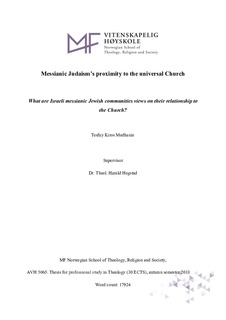Messianic Judaism’s proximity to the universal Church : What are Israeli messianic Jewish communities views on their relationship to the Church?
Master thesis
Permanent lenke
http://hdl.handle.net/11250/2588825Utgivelsesdato
2018Metadata
Vis full innførselSamlinger
Sammendrag
Messianic Judaism is negotiating the claim that, - faith in Jesus is possible while maintaining Jewish identity - between the gentiles dominated Church and the Jewish world that is reluctant to see faith in Jesus as less than a threat to it.
We examine how the Jewish messianic believers in Israel view their place in relation to the Church. Because this is an ecumenical question, we take that perspective. With the help of an ecumenical theory of unity, we developed from the ecumenical Movements vision of unity, questions about ecumenical proximity to the universal church. Through interviews and participant observations, we posed the theological question to four messianic Jewish congregations in Israel.
The answer to our question is that messianic Jewish believers position themselves in various proximities to the ecumenical vision of the unified church. The messianic Jewish communities in Israel have differing stances and understandings reflecting their different backgrounds. Most of them place themselves well into the ecumenical ideal for unity in praxis. While the one community showed an inclination for disassociation with Christianity, for the sake of re-imbedding -faith in Jesus- in Judaism of today.
We also see that a living messianic Judaism today can provides the Church historical opportunity to amend for errors and regain its identity as rooted in the Jewish People. As well, as gain a model for diversity without compromising its unity.
